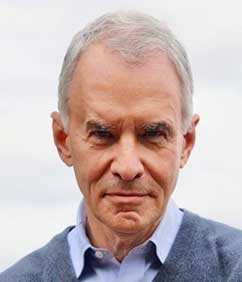Former hedge fund manager Jay Newman LLM ’81 reinvents himself as a novelist
After decades as a hedge fund portfolio manager for Elliott Management, Jay Newman LLM ’81, knew he had a book in him.
Newman’s debut novel, Undermoney, was published by Scribner last year. A political thriller packed with dark money, undercover CIA operatives, and a barely-fictionalized Vladimir Putin, the book was hailed by the Wall Street Journal as “an important story…[told] with a combination of investigative skill and dramatic flair.”
Newman, known for his successful 15-year fight to recover billions in defaulted debt from the Argentinian government for Elliott, says that writing fiction fulfills a lifelong passion, but one that he could only pursue after retiring in 2016. “I have always been interested in writing,” he says. “But when I retired, I started thinking about applying some of what I observed throughout my career to communicate the complexity of the financial world in a sophisticated and compelling way.” Newman is currently at work on the next two books in what he envisions as a trilogy.
In this Q&A, Newman talks to NYU Law about how his Tax LLM led him to a career marked by continuous evolution and what excites him about the possibilities of fiction.
How did you become interested in a legal career?
I think, like so many people, I fell into law without having a clear idea of what law was or what I would do with it. I was, in many ways, an accidental lawyer. I found tax interesting. It led me to work on the tax transactions that introduced me to business. I was working on safe harbor lease transactions, and I ended up meeting people at Lehman Brothers working on those transactions, and they recruited me to go there to work on new product development. In a very direct way, my tax LLM led me to my career in business.
How did you come to work on issues of sovereign debt?
When I was at Lehman, I was working on the new product development committee. One of the things I was asked to look at was whether Lehman could start making a market in defaulted bank loans. This was the early ’80s, a period when countries around the world were defaulting on their debts, and lots of banks were strangling on these loans, but there was no active market anywhere. What they asked me to do was to talk to banks, talk to countries, and figure out whether a market could be developed. I did that as part of my new product job and then I came back and wrote a business plan. When the dust settled, they asked me to start the business.
This is, again, where law comes into the picture. At Lehman and then at Morgan Stanley, I was trading development country debt. But what I realized was that most people weren’t actually reading the bond contracts, and that most people didn’t think about the possibility that bond contracts could be enforced, even when a country’s finances were strong and improving. I ended working at a major hedge fund, investing in defaulted sovereign debt, for about 20 years.
After you retired, how did you decide to turn to fiction?
The steps were logical, but random. I couldn’t have anticipated anything that happened to me in my career, much less ending up as a novelist. The law gave me the ability to read contracts closely, and to manage litigation. The experience I had in dealing with developing countries—seeing the corruption that persisted, and persists in most countries—led me to my skeptical worldview, which led me to writing fiction.
I’d written op-eds over the years for the Wall Street Journal and the Financial Times. When I retired, people said, “What you did was interesting. You should write a book about it.” I started to write a [nonfiction] book, but I realized it was going to be a snooze, nobody would read it.
Writing the novel was challenging, because I had never written anything longer than about a thousand words. I wanted to write a financial, political thriller that would be exciting and interesting to people who are in the hedge fund and business worlds. I wanted them to think: “Yeah, he nailed that.” And for people not involved in finance or business, I wanted them to wonder: “Wow, that’s crazy—is that how things really are? I never thought about the world that way.”
Has your writing changed since having a novel out in the world? How are you approaching your next project?
My book is heavily researched and extremely detailed. That’s the hallmark of what I’m trying to do. I want to keep people interested and maintain my credibility. The research is very, very time-consuming, but it’s really interesting to think about the political, social, and financial disasters that might befall the world. Right now, I’m doing a lot of research and trying to think through the fragility of the world, our financial system, and our political system.
The events described in Undermoney quite accurately anticipated many of the things that have happened in the world since its publication. I set one scene set in St. Petersburg where Vladimir Putin closes down the whole town just so he can walk around by himself. I had no idea how chillingly accurate that might be. Now, I’m trying to be just as thoughtful about the next phase in geopolitics.
I am also still consulting for clients on issues involving the enforcement of of sovereign debt claims. I really like continuing to be involved in advising people on real-time problems—not only because it gives me a chance to meet new people, but also to be thinking about specific problems in finance and politics in much deeper way than if I were just writing fiction. Maintaining a foot in the business/legal world is really important to me.
This interview has been edited and condensed. Posted January 19, 2023. Photo credit: Philip Balshi.


